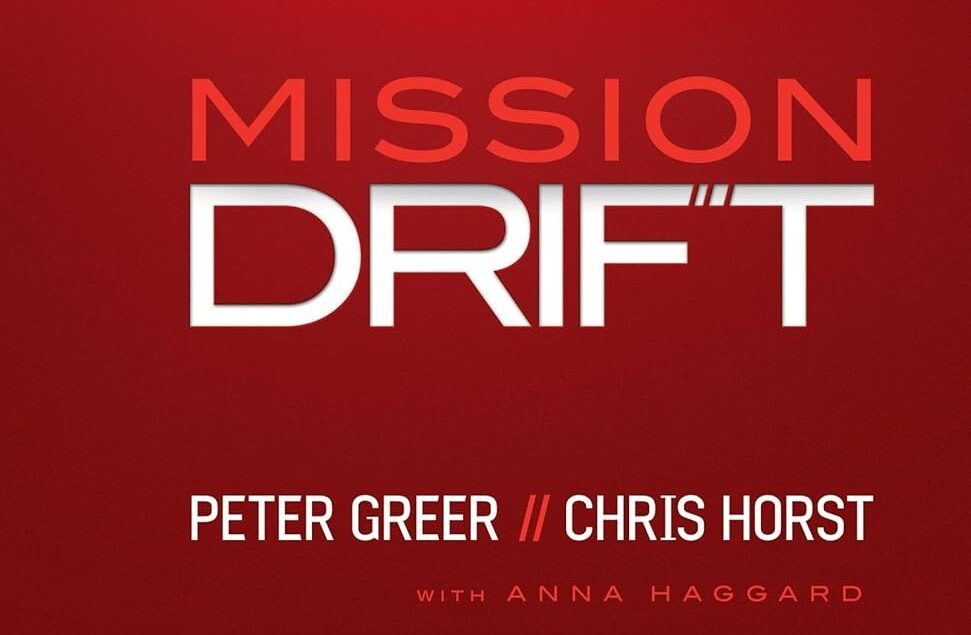Mission Drift
An M3 Weekly Book Review
There’s a common saying that if you put a frog in a pot of water and slowly raise the temperature, it will sit there until it boils. Scientists have actually shown that’s not true—frogs, it turns out, are sensible enough to jump out before it’s too late. Humans, however, are another story. We are remarkably adept at adjusting to slow, almost imperceptible shifts. What starts as a small compromise or a subtle change in focus can, over time, turn into something quite different from what we first set out to do. In this sense, frogs may be wiser than we are.
That’s the concern at the heart of Peter Greer and Chris Horst’s book Mission Drift. They begin with sobering examples of organizations that started with a solid gospel foundation yet drifted far from it. Harvard University, founded in 1636, had as its mission statement: “To be plainly instructed and consider well that the main end of your life and studies is to know God and Jesus Christ.” Today, that original mission is unrecognizable. Many similar stories fill the book, and they serve as a warning that no organization is immune to the danger of drifting.
Yet Mission Drift is not only about failure. Just as importantly, the authors highlight organizations that stayed “mission true.” They draw striking comparisons between groups that began in nearly identical ways, but whose trajectories diverged.
- The Crowell Trust, founded by Henry Crowell of Quaker Oats, has remained faithful to its Christian roots, while the Pew Charitable Trusts, begun with a similar vision, drifted over time.
- Compassion International has held firm to its Christ-centered mission, while ChildFund (originally Christian Children’s Fund) changed both its mission and even its name.
- Both InterVarsity and the YMCA were born out of 19th-century movements to impact British young people with the gospel of Jesus. However, while the YMCA has largely become known for its fitness centers (and perhaps a dance-along song), InterVarsity still seeks to reach students with the gospel.
These side-by-side contrasts make the point powerfully: drift is not inevitable, but staying true requires clarity and intentionality.
Greer and Horst go further than warnings and stories—they provide actionable steps. They introduce two critical factors—clarity and intentionality—and a self-assessment tool to help leaders see where their organization stands on that axis. They also press into practical areas of leadership:
- Boards: members must understand that protecting the mission is their highest calling.
- Funding: chasing money from sources that do not share your values can lure an organization into compromise.
- Hiring: credentials matter, but so does character, spiritual maturity, and alignment with the Christ-centered focus of your mission.
- Metrics: measuring impact is difficult but necessary, and the best metrics go beyond numbers to seek evidence of genuine heart-level change.
Implications for Missional Entrepreneurs
For missional enterprise leaders, the pertinence is obvious. Our vision is not just financial or social—it is also deeply spiritual. We are weaving profit, disciple-making, and community transformation into a single fabric. If that fabric unravels, the consequences reach beyond sustainability into matters of eternal weight. Mission drift for us is not just organizational failure; it is a betrayal of calling. That’s why we need to design “moats” around our mission from the very beginning and surround ourselves with people who can speak the truth in love when we waver. Mission Drift provides engaging stories, insightful principles, and actionable practices to follow, and we recommend it as a valuable resource1 to guide missional enterprise leaders who want to stay mission true.
We conclude, as the authors do, with an encouragement to follow the examples of faithful leaders who have stayed mission true:
“From their founding, these leaders have stood unwaveringly upon the truth of the gospel. In all areas, they have demonstrated intentionality and clarity… Today, you have the privilege of choosing which path your organization, church, and ministry will take. Will you follow the path toward mission drift, or will you have the intentionality, courage, and resolve to follow a path of faithfulness?”
Verse of the Week:
“Watch over your heart with all diligence, for from it flow the springs of life.” —Proverbs 4:23
What steps can we take today to watch over our hearts and protect against “mission drift” in the organizations we lead?
